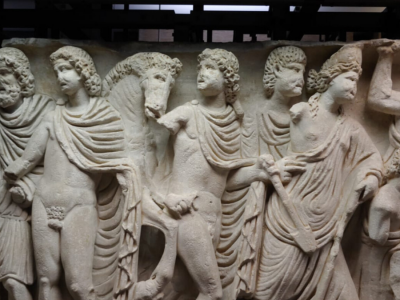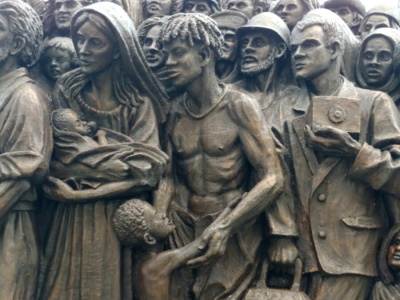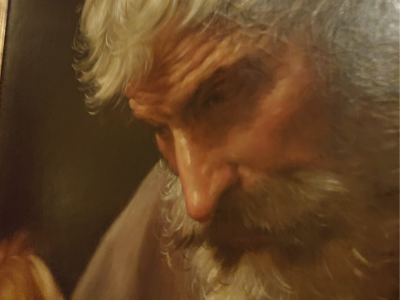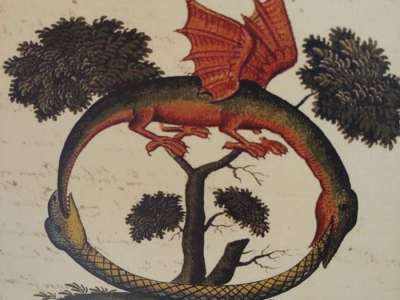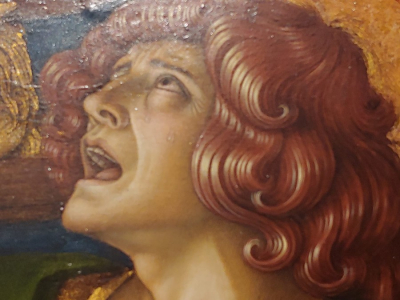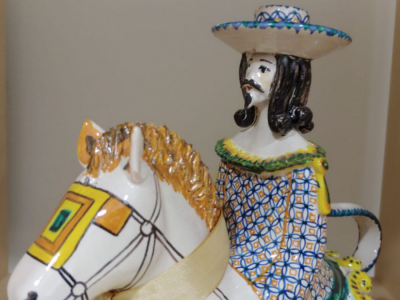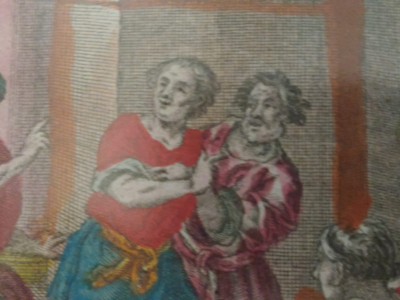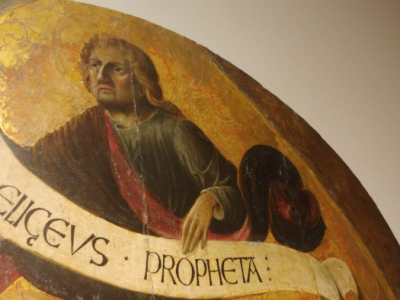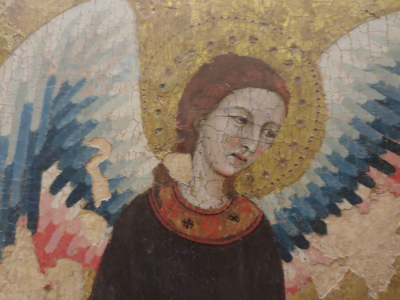stdClass Object
(
[id] => 16175
[title] => The economy of smallness
[alias] => the-economy-of-smallness
[introtext] => Prophecy is history /29 – It is in defeat, when a story ends, that we discover the truth and strength of God
by Luigino Bruni
Published in Avvenire 22/12/2019
"Why did you take my children away, why did you have them killed by the sword and left them at the mercy of the enemies? And then the supreme God was moved with compassion and said: «For you Rachel, for you I will bring the children of Israel back to their land»"
Louis Ginzberg, The legends of the Jews
We have reached the end of the commentary on the Books of Kings, with the destruction of Jerusalem and the exile. But even within exile, a paradoxical sort of can be found hidden
«On the seventh day of the fifth month, in the nineteenth year of Nebuchadnezzar king of Babylon, Nebuzaradan commander of the imperial guard, an official of the king of Babylon, came to Jerusalem. He set fire to the temple of the Lord, the royal palace and all the houses of Jerusalem. Every important building he burned down. The whole Babylonian army under the commander of the imperial guard broke down the walls around Jerusalem. Nebuzaradan the commander of the guard carried into exile the people who remained in the city, along with the rest of the populace and those who had deserted to the king of Babylon» (2 Kings 25,8-11). With this, the end of the history of Jerusalem, occupied, destroyed, set on fire and with part of the people deported to Babylon, our commentary on the Second Book of Kings also come to an end. And that story that started in Genesis, in shapeless chaos, also ends vivified and ordered by the Spirit. There, Adam makes his appearance in the story, the centre of that creation that culminates in the Shabbat, in the act / non-act with which Elohim, on the seventh day, "stops" (Shabbat) and separates himself from his creation. A pause and a separation that are also the beginning of the story, that is, that intertwining of life and death, of virtue and sin, of the words of God and the words of men and women, of which the Bible is composed. Shabbat (not man) is the culmination of creation, and it is also its destiny and eskaton. Creation ends with Shabbat telling us that the story will end when everything is Shabbat, when the same law will apply to all men and women without the distinctions of the many statuses of the other six days, and when human fraternity will embrace earth and the cosmos. We will never find a possible relationship capable of a future with creation, if we do not give life to a new culture of Shabbat, if we do not learn to "stop" or pause again.
[fulltext] =>
The "story" of Adam, Eve, Cain, Abel, Noah, Abraham, the patriarchs, Egypt, Moses and the liberation from slavery, the promised land, and then Samuel, Saul, David and the monarchy up to the last king of Judah, Jehoiachin, with whom the Second Book of Kings ends, ends today: «In the thirty-seventh year of the exile of Jehoiachin king of Judah, in the year Awel-Marduk became king of Babylon, he released Jehoiachin king of Judah from prison. He did this on the twenty-seventh day of the twelfth month. He spoke kindly to him and gave him a seat of honour higher than those of the other kings who were with him in Babylon. So Jehoiachin put aside his prison clothes and for the rest of his life ate regularly at the king’s table. Day by day the king gave Jehoiachin a regular allowance as long as he lived» (2 Kings 25,27-30). Here, we find ourselves thirty-seven years after the deportation (in 561), and we discern a note of hope: Jehoiachin, the king considered by part of the people (and by the editor) as the legitimate heir of David, is freed, and a place is especially reserved for him in the court of the new king of Babylon, the son of Nebuchadnezzar - a fact that we also find mentioned in Jeremiah (Jeremiah 52,31-34), also indirectly confirmed by some ancient texts found in Babylon. Israel's history ends with the hope that exile will not be the last word spoken. Here, perhaps, we find an echo of the great and constant teachings of the prophet Jeremiah: a story comes to an end, but the story is not over, because a remnant will return. The editor of these last terrible chapters sees in the rehabilitation of the last king of Judah a sign and an announcement that that story which began in the great silence of creation will still be able to continue. Because in the biblical canvas reaching all the way from Genesis to the last Davidic king, the warp that intertwines with the plot of historical events, is represented by the words and actions of the prophets. The words and actions of those prophets that we find mentioned in historical books (Elijah, Elisha, Isaiah, the prophetess Huldah, Samuel and many others, with a name or who remain nameless, that we have met in the last couple of months), but also the words and actions of other prophets who contributed directly to the interpretation of that story being told.
In fact, we would have a very different story, another sense of the facts and another kind of salvation without Ezekiel, Jeremiah and the second Isaiah, and without the other non-false prophets, almost always unknown and nameless. These prophets saw, prophesied and lived the fall of Jerusalem and the Babylonian exile, they provided first and essential words to understand the huge tragedy that was happening before their eyes. The exile was also, despite the immense pain, a favourable time of blessing for the people of Judah also thanks to the presence of the prophets in that great Shoah (devastating storm). As long as there is a prophet next to us sharing our very own hell, we are able to discern a sliver of paradise. The oracles and sings of Ezekiel, the burning words of Jeremiah, the chants of the servant of YHWH of the second Isaiah, were that very loophole that from hell reached heaven, from which they were able to see a shalom possible even in exile; this helped them not to forget the Covenant and the promise, and continue to dream of their different God without confusing him with the attractive Babylonian gods. We will always have the hope to return home, as long as we never stop dreaming about it while in exile. Those marvellous and immense prophets, whom we have been able to get to know a little in these last years of Sunday commentaries, kept YHWH's dream alive, and were able to keep him "alive" and living although he had been defeated (all faith continues to live in the middle of our crises if we just decide to keep it alive, making it resurrect, and not forgetting it under the weight of the immense pain of our defeats and disappointments). And so, after the exile, "YHWH the Lord of armies" became "YHWH the Lord of the heavenly hosts": political defeat was essential in order to understand that the Kingdom of God and his oikonomia are not those of power but of weakness, and that the place where God lives is "heaven" and therefore it was possible to pray to Him and have Him along the rivers of Babylon as well, even without that wonderful temple now sacked, destroyed and burned. The death of the ancient idea of YHWH generated a higher, more spiritual and universal one while in exile, which is the great theological and ethical gift left to us by humanism and biblical history.
Exile was the time when some of the most beautiful and important books in the Bible were written. Many of the psalms flourished from those tears, the immense prophetic texts were generated there, the founding tales of Genesis and Exodus were written there, all being children of the greatest of collective pains. While everything collapsed, while the destruction was most radical, while the holy city of David and the temple of Solomon were devastated and set on fire, that same injured land produced some of the greatest literature masterpieces of all time. In that exile, without a temple and without a homeland, those writers were able to "review" the temple reborn from Solomon's wisdom, as beautiful and pure as the first day when everything was bright and uncontaminated. They revised Abraham's faith and, as they shared it with us, they once again believed the promise of a land that had now become a pile of rubble; they were able to understand and narrate the alliance with YHWH with splendid words while the covenant and choice were being swept away by Nebuchadnezzar and his empire. They believed, saw and wrote wonderful words about God, because they had already been able to believe in them before in the darkest night of faith: the Burning Bush, Jacob’s battle, Miriam’s song and her dancing with the tambourine, the great words of the Sinai all arose from that generative darkness...; in the midst of that devastation they told us about the liberation from Egyptian slavery as they themselves were being led into Babylonian slavery, and that same slavery made the story of the parting sea wonderful.
What if this today, in this time of the destruction of our temples, when a story has clearly ended, could be the right time to write the best books? All this would not have been possible without the prophets, who acted as the new Moses, capable of indicating a land risen once again in the time of its holy Shabbat: «However, the days are coming,” declares the Lord, “when it will no longer be said, ‘As surely as the Lord lives, who brought the Israelites up out of Egypt,’ but it will be said, ‘As surely as the Lord lives, who brought the Israelites up out of the land of the north and out of all the countries where he had banished them.’ For I will restore them to the land I gave their ancestors!"» (Jeremiah 16,14-15). A new promise, a new alliance, a new land. Only prophets can do these things. Sometimes we know how to do them a little, too. When we are able to say sublime words about love and marriage to a friend from above the rubble of our love story; or when we sincerely say beautiful and true words about faith and a God who has not spoken to us for many years, abandoned in an exile that seems to never end; or when we want paradise to exist even if we are convinced that it is not meant for us. Herein lies much of the meaning of one of the most beautiful human-divine words there are: gratuity. The Bible is many things all at once, but it is also and above all a great song to gratuity. Here, everything is grace. Gratuitousness is also another name for Shabbat. Because if in a land without a temple, Shabbat became the temple of time in Babylon, exile became the Shabbat of history, that time when everything paused, everything "stopped". Worship stopped, sacrifices stopped, religion stopped, choice stopped, promise stopped, God stopped too. And after that collective and epochal stop, nothing was ever the same again. It is while finding ourselves in exile that we truly learn about time.
And once again we have reached the end. Once again, as every time, what remains is the joy of the journey, of the encounters, and above all of the surprises; and every time that deep melancholy remains for something that ends, which is (in part) is taken care of by the Bible itself: «The end of a matter is better than its beginning» (Ecclesiastes 7,8). And the impression remains that you have written many words but not those that should have been written – maybe this impotent awareness is the gratuitousness of this profession? Once again, thanks to Avvenire, to its director, Marco Tarquinio, who continues to believe, ever since Christmas six years ago, in the work of an economist who insists on commenting on the Bible. And, as always, thanks to you readers, for the many letters, for your kind friendship. Finally, after these six months spent in the company of the Books of Kings, the "oikonomia of smallness" remains: that of David, the youngest of the children, chosen not by merit but by grace; that of Bethlehem, the smallest of the cities of Judah. The wait remains, the desire remains to dream of God and not forget him in the long time of exile.
Download article in pdf
[checked_out] => 0
[checked_out_time] => 0000-00-00 00:00:00
[catid] => 901
[created] => 2019-12-22 05:48:46
[created_by] => 64
[created_by_alias] => Luigino Bruni
[state] => 1
[modified] => 2021-04-18 06:56:35
[modified_by] => 609
[modified_by_name] => Super User
[publish_up] => 2020-01-11 05:48:46
[publish_down] => 0000-00-00 00:00:00
[images] => {"image_intro":"","float_intro":"","image_intro_alt":"","image_intro_caption":"","image_fulltext":"","float_fulltext":"","image_fulltext_alt":"","image_fulltext_caption":""}
[urls] => {"urla":false,"urlatext":"","targeta":"","urlb":false,"urlbtext":"","targetb":"","urlc":false,"urlctext":"","targetc":""}
[attribs] => {"article_layout":"","show_title":"","link_titles":"","show_tags":"","show_intro":"","info_block_position":"","info_block_show_title":"","show_category":"","link_category":"","show_parent_category":"","link_parent_category":"","show_associations":"","show_author":"","link_author":"","show_create_date":"","show_modify_date":"","show_publish_date":"","show_item_navigation":"","show_icons":"","show_print_icon":"","show_email_icon":"","show_vote":"","show_hits":"","show_noauth":"","urls_position":"","alternative_readmore":"","article_page_title":"","show_publishing_options":"","show_article_options":"","show_urls_images_backend":"","show_urls_images_frontend":"","helix_ultimate_image":"images\/2019\/12\/22\/20191222.png","helix_ultimate_image_alt_txt":"","spfeatured_image":"","helix_ultimate_article_format":"standard","helix_ultimate_audio":"","helix_ultimate_gallery":"","helix_ultimate_video":"","video":""}
[metadata] => {"robots":"","author":"","rights":"","xreference":""}
[metakey] =>
[metadesc] =>
[access] => 1
[hits] => 1704
[xreference] =>
[featured] => 1
[language] => en-GB
[on_img_default] =>
[readmore] => 9828
[ordering] => 1
[category_title] => EN - Prophecy is history
[category_route] => commenti-biblici/serie-bibliche/it-profezia-e-storia
[category_access] => 1
[category_alias] => en-prophecy-is-history
[published] => 1
[parents_published] => 1
[lft] => 133
[author] => Luigino Bruni
[author_email] => ferrucci.anto@gmail.com
[parent_title] => IT - Serie bibliche
[parent_id] => 773
[parent_route] => commenti-biblici/serie-bibliche
[parent_alias] => serie-bibliche
[rating] => 0
[rating_count] => 0
[alternative_readmore] =>
[layout] =>
[params] => Joomla\Registry\Registry Object
(
[data:protected] => stdClass Object
(
[article_layout] => _:default
[show_title] => 1
[link_titles] => 1
[show_intro] => 1
[info_block_position] => 0
[info_block_show_title] => 1
[show_category] => 1
[link_category] => 1
[show_parent_category] => 1
[link_parent_category] => 1
[show_associations] => 0
[flags] => 1
[show_author] => 0
[link_author] => 0
[show_create_date] => 1
[show_modify_date] => 0
[show_publish_date] => 1
[show_item_navigation] => 1
[show_vote] => 0
[show_readmore] => 0
[show_readmore_title] => 0
[readmore_limit] => 100
[show_tags] => 1
[show_icons] => 1
[show_print_icon] => 1
[show_email_icon] => 1
[show_hits] => 0
[record_hits] => 1
[show_noauth] => 0
[urls_position] => 1
[captcha] =>
[show_publishing_options] => 1
[show_article_options] => 1
[save_history] => 1
[history_limit] => 10
[show_urls_images_frontend] => 0
[show_urls_images_backend] => 1
[targeta] => 0
[targetb] => 0
[targetc] => 0
[float_intro] => left
[float_fulltext] => left
[category_layout] => _:blog
[show_category_heading_title_text] => 0
[show_category_title] => 0
[show_description] => 0
[show_description_image] => 0
[maxLevel] => 0
[show_empty_categories] => 0
[show_no_articles] => 1
[show_subcat_desc] => 0
[show_cat_num_articles] => 0
[show_cat_tags] => 1
[show_base_description] => 1
[maxLevelcat] => -1
[show_empty_categories_cat] => 0
[show_subcat_desc_cat] => 0
[show_cat_num_articles_cat] => 0
[num_leading_articles] => 0
[num_intro_articles] => 14
[num_columns] => 2
[num_links] => 0
[multi_column_order] => 1
[show_subcategory_content] => -1
[show_pagination_limit] => 1
[filter_field] => hide
[show_headings] => 1
[list_show_date] => 0
[date_format] =>
[list_show_hits] => 1
[list_show_author] => 1
[list_show_votes] => 0
[list_show_ratings] => 0
[orderby_pri] => none
[orderby_sec] => rdate
[order_date] => published
[show_pagination] => 2
[show_pagination_results] => 1
[show_featured] => show
[show_feed_link] => 1
[feed_summary] => 0
[feed_show_readmore] => 0
[sef_advanced] => 1
[sef_ids] => 1
[custom_fields_enable] => 1
[show_page_heading] => 0
[layout_type] => blog
[menu_text] => 1
[menu_show] => 1
[secure] => 0
[helixultimatemenulayout] => {"width":600,"menualign":"right","megamenu":0,"showtitle":1,"faicon":"","customclass":"","dropdown":"right","badge":"","badge_position":"","badge_bg_color":"","badge_text_color":"","layout":[]}
[helixultimate_enable_page_title] => 1
[helixultimate_page_title_alt] => Profezia è storia
[helixultimate_page_subtitle] => Commenti Biblici
[helixultimate_page_title_heading] => h2
[page_title] => Prophecy is history
[page_description] =>
[page_rights] =>
[robots] =>
[access-view] => 1
)
[initialized:protected] => 1
[separator] => .
)
[displayDate] => 2019-12-22 05:48:46
[tags] => Joomla\CMS\Helper\TagsHelper Object
(
[tagsChanged:protected] =>
[replaceTags:protected] =>
[typeAlias] =>
[itemTags] => Array
(
[0] => stdClass Object
(
[tag_id] => 18
[id] => 18
[parent_id] => 1
[lft] => 33
[rgt] => 34
[level] => 1
[path] => luigino-bruni
[title] => Luigino Bruni
[alias] => luigino-bruni
[note] =>
[description] =>
[published] => 1
[checked_out] => 0
[checked_out_time] => 0000-00-00 00:00:00
[access] => 1
[params] => {"tag_layout":"","tag_link_class":"label label-info"}
[metadesc] =>
[metakey] =>
[metadata] => {"author":"","robots":""}
[created_user_id] => 611
[created_time] => 2015-11-14 21:22:09
[created_by_alias] =>
[modified_user_id] => 609
[modified_time] => 2020-08-01 10:35:46
[images] => {"image_intro":"","float_intro":"","image_intro_alt":"","image_intro_caption":"","image_fulltext":"","float_fulltext":"","image_fulltext_alt":"","image_fulltext_caption":""}
[urls] => {}
[hits] => 127675
[language] => *
[version] => 1
[publish_up] => 2015-11-14 20:22:09
[publish_down] => 2015-11-14 20:22:09
)
[1] => stdClass Object
(
[tag_id] => 35
[id] => 35
[parent_id] => 1
[lft] => 67
[rgt] => 68
[level] => 1
[path] => profezia-e-storia
[title] => Profezia è storia
[alias] => profezia-e-storia
[note] =>
[description] =>
[published] => 1
[checked_out] => 0
[checked_out_time] => 0000-00-00 00:00:00
[access] => 1
[params] => {}
[metadesc] =>
[metakey] =>
[metadata] => {}
[created_user_id] => 609
[created_time] => 2019-06-01 21:20:29
[created_by_alias] =>
[modified_user_id] => 0
[modified_time] => 2020-08-10 04:38:16
[images] => {}
[urls] => {}
[hits] => 11806
[language] => *
[version] => 1
[publish_up] => 2019-06-01 21:20:29
[publish_down] => 2019-06-01 21:20:29
)
)
)
[slug] => 16175:the-economy-of-smallness
[parent_slug] => 773:serie-bibliche
[catslug] => 901:en-prophecy-is-history
[event] => stdClass Object
(
[afterDisplayTitle] =>
[beforeDisplayContent] =>
[afterDisplayContent] =>
)
[text] => Prophecy is history /29 – It is in defeat, when a story ends, that we discover the truth and strength of God
by Luigino Bruni
Published in Avvenire 22/12/2019
"Why did you take my children away, why did you have them killed by the sword and left them at the mercy of the enemies? And then the supreme God was moved with compassion and said: «For you Rachel, for you I will bring the children of Israel back to their land»"
Louis Ginzberg, The legends of the Jews
We have reached the end of the commentary on the Books of Kings, with the destruction of Jerusalem and the exile. But even within exile, a paradoxical sort of can be found hidden
«On the seventh day of the fifth month, in the nineteenth year of Nebuchadnezzar king of Babylon, Nebuzaradan commander of the imperial guard, an official of the king of Babylon, came to Jerusalem. He set fire to the temple of the Lord, the royal palace and all the houses of Jerusalem. Every important building he burned down. The whole Babylonian army under the commander of the imperial guard broke down the walls around Jerusalem. Nebuzaradan the commander of the guard carried into exile the people who remained in the city, along with the rest of the populace and those who had deserted to the king of Babylon» (2 Kings 25,8-11). With this, the end of the history of Jerusalem, occupied, destroyed, set on fire and with part of the people deported to Babylon, our commentary on the Second Book of Kings also come to an end. And that story that started in Genesis, in shapeless chaos, also ends vivified and ordered by the Spirit. There, Adam makes his appearance in the story, the centre of that creation that culminates in the Shabbat, in the act / non-act with which Elohim, on the seventh day, "stops" (Shabbat) and separates himself from his creation. A pause and a separation that are also the beginning of the story, that is, that intertwining of life and death, of virtue and sin, of the words of God and the words of men and women, of which the Bible is composed. Shabbat (not man) is the culmination of creation, and it is also its destiny and eskaton. Creation ends with Shabbat telling us that the story will end when everything is Shabbat, when the same law will apply to all men and women without the distinctions of the many statuses of the other six days, and when human fraternity will embrace earth and the cosmos. We will never find a possible relationship capable of a future with creation, if we do not give life to a new culture of Shabbat, if we do not learn to "stop" or pause again.
[jcfields] => Array
(
)
[type] => intro
[oddeven] => item-odd
)
